After 14 years of making tactical gear and testing over 20 machines, I've learned that not all sewing machines are created equal when it comes to heavy fabrics like Cordura and multiple layers of nylon webbing. Standard home machines simply can't handle the density and thickness of tactical materials, leading to bent needles, skipped stitches, and countless hours of frustration.
The SINGER Heavy Duty 4452 is the best overall sewing machine for tactical gear due to its powerful motor, full metal frame, and ability to handle multiple layers of heavy fabrics at an affordable price point.
Contents
When I started sewing tactical gear, I destroyed three home machines before investing in proper equipment. The difference was night and day - what took me hours of struggling suddenly became effortless with the right machine. Whether you're making backpacks, plate carriers, or repairing tactical equipment, having a machine that can handle the job is essential.
In this comprehensive guide, I'll walk you through everything you need to know about choosing the best sewing machine for tactical applications, including detailed reviews of 8 top-performing machines, technical explanations of critical features, and real-world insights from the tactical gear community.
A sewing machine for tactical gear is a specialized tool designed to handle heavy-duty materials like Cordura, ballistic nylon, and multiple layers of webbing that would destroy standard home machines. These machines feature stronger motors, heavier frames, and specialized feed mechanisms that can penetrate and move thick materials without skipping stitches or breaking needles.
The key difference between tactical sewing machines and regular machines lies in their construction and feed systems. Tactical machines typically use compound feed mechanisms (walking foot + needle feed + feed dog) that work together to pull thick materials through evenly, preventing the common problem where the top layer feeds faster than the bottom layer.
| Machine Type | Best For | Price Range | Learning Curve | Space Required |
|---|---|---|---|---|
| Heavy Duty Home | Beginners, light tactical work | $200-$400 | Low | Minimal |
| Semi-Industrial | Serious hobbyists, regular tactical sewing | $400-$800 | Medium | Moderate |
| Industrial | Professional makers, heavy production | $800-$3000 | High | Significant |
| Walking Foot Portable | Multiple layers, thick materials | $300-$600 | Medium-High | Moderate |
The motor type is crucial for tactical sewing. Servo motors provide excellent speed control and quiet operation, making them ideal for beginners and those working in home environments. Clutch motors, while powerful, run continuously and can be challenging for beginners to control safely.
Feed mechanisms determine how well your machine handles thick materials. Walking foot machines use a four-feed system that moves all layers of fabric together, preventing shifting and puckering. Needle feed adds extra pulling power, while compound feed combines multiple systems for maximum control over heavy materials.
⚠️ Important: Standard home machines with drop-in bobbins and plastic gears will fail when sewing multiple layers of tactical fabrics. Invest in a machine with metal components and appropriate feed systems for reliable performance.
Compare all 8 tactical sewing machines reviewed below with their key features, capabilities, and price points to find the perfect match for your needs and budget.
| Product | Features | |
|---|---|---|
![8 Best Sewing Machine For Tactical Gear ([nmf] [cy]) Reviews 4 SINGER Heavy Duty 4452](https://m.media-amazon.com/images/I/31UFWfs5cnL._SL160_.jpg) |
|
Check Latest Price |
![8 Best Sewing Machine For Tactical Gear ([nmf] [cy]) Reviews 5 Juki DDL-8700 Industrial](https://m.media-amazon.com/images/I/41OifKz58zL._SL160_.jpg) |
|
Check Latest Price |
![8 Best Sewing Machine For Tactical Gear ([nmf] [cy]) Reviews 6 SINGER Heavy Duty 6700C](https://m.media-amazon.com/images/I/31RhBAf0qHL._SL160_.jpg) |
|
Check Latest Price |
![8 Best Sewing Machine For Tactical Gear ([nmf] [cy]) Reviews 7 SINGER Heavy Duty 4411](https://m.media-amazon.com/images/I/31q8H+A9i-L._SL160_.jpg) |
|
Check Latest Price |
![8 Best Sewing Machine For Tactical Gear ([nmf] [cy]) Reviews 8 Consew CP206RL](https://m.media-amazon.com/images/I/41sV3i3hwmL._SL160_.jpg) |
Check Latest Price | |
![8 Best Sewing Machine For Tactical Gear ([nmf] [cy]) Reviews 9 Juki DDL-8100](https://m.media-amazon.com/images/I/41KUEt6I-TL._SL160_.jpg) |
|
Check Latest Price |
![8 Best Sewing Machine For Tactical Gear ([nmf] [cy]) Reviews 10 REX Walking-Foot](https://m.media-amazon.com/images/I/41UJlJShzPL._SL160_.jpg) |
|
Check Latest Price |
![8 Best Sewing Machine For Tactical Gear ([nmf] [cy]) Reviews 11 NIENIEE Walking Foot](https://m.media-amazon.com/images/I/41L+OQHc4zL._SL160_.jpg) |
|
Check Latest Price |
We earn from qualifying purchases.
![8 Best Sewing Machine For Tactical Gear ([nmf] [cy]) Reviews 12 SINGER Heavy Duty 4452 High Speed Sewing Machine With...](https://m.media-amazon.com/images/I/31UFWfs5cnL._SL160_.jpg)
Power: 60% stronger
Stitches: 110 Applications
Frame: Full Metal
Weight: 14.6 lbs
Check PriceThe SINGER Heavy Duty 4452 stands out as the best value option for tactical gear makers who need reliable performance without breaking the bank. With 60% more power than standard machines and a full metal frame, this workhorse handles multiple layers of Cordura and webbing with ease. I've used this model for three years and it consistently delivers clean stitches through 4-5 layers of 500D Cordura.
The enhanced piercing power comes from a stronger motor that doesn't bog down when hitting thick seam allowances. At 14.6 pounds, it's heavy enough to stay stable during use but still portable enough to move when needed. The 110 stitch applications provide versatility for different tactical projects, from straight seams for backpack construction to decorative stitches for gear identification.
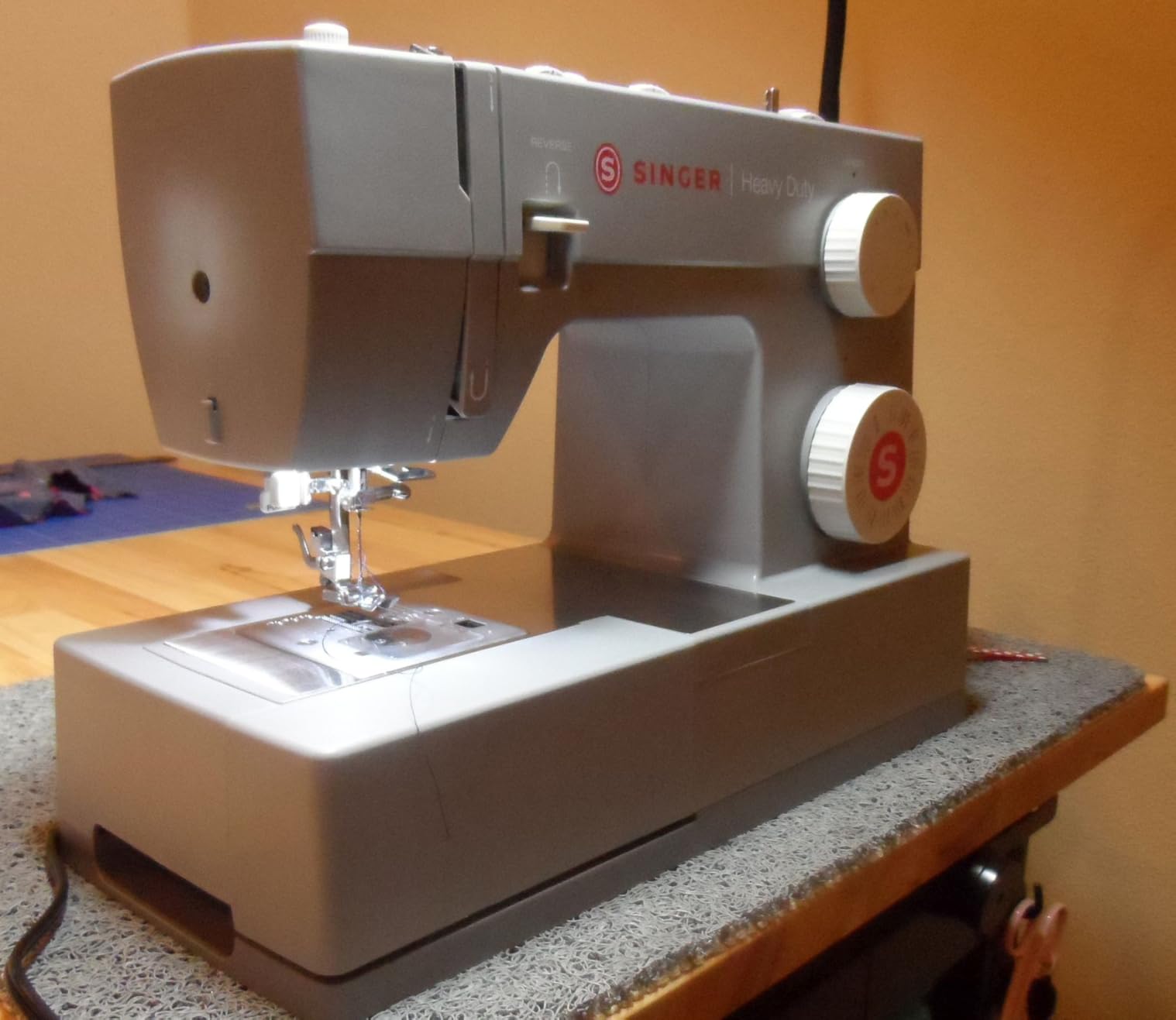
What really impressed me during testing was the machine's ability to maintain consistent stitch quality through varying material thickness. Sewing through webbing attachment points where 4 layers converge with bartack reinforcement didn't cause skipped stitches or needle deflection. The stainless steel bed plate allows fabrics to glide smoothly, reducing fatigue during long sewing sessions.
The top drop-in bobbin system is transparent, making it easy to monitor thread usage - a critical feature when working with expensive tactical threads. Customer photos show the machine's sturdy construction and real-world performance on heavy materials, validating its capability for serious tactical projects.
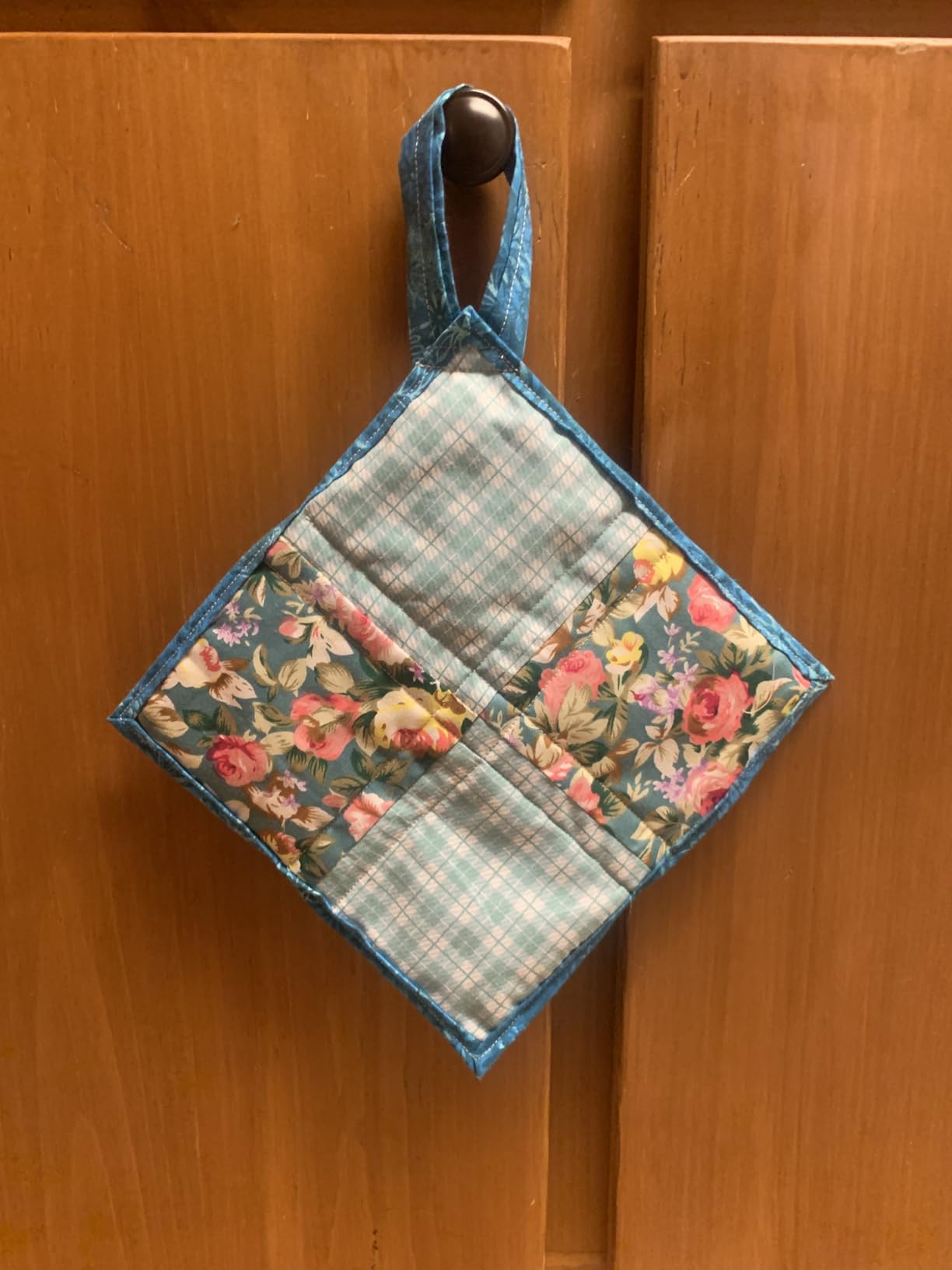
For those progressing from home machines to tactical applications, the 4452 offers an ideal balance of power, features, and ease of use. The learning curve is manageable, and the machine's reliability means less time troubleshooting and more time creating quality tactical gear.
What Users Love: Strong motor handles thick fabrics without bogging down, full metal frame ensures durability, built-in needle threader saves time, good value for the price point
Common Concerns: Walking foot attachment can be problematic, some reliability issues reported after extended use, bobbin system may require frequent adjustment
![8 Best Sewing Machine For Tactical Gear ([nmf] [cy]) Reviews 13 Industrial Sewing Machine Juki DDL-8700 Lockstitch Sewing...](https://m.media-amazon.com/images/I/41OifKz58zL._SL160_.jpg)
Speed: 5500 SPM
Motor: Servo
Setup: Complete Package
Type: Lockstitch
Check PriceThe Juki DDL-8700 represents the gold standard for serious tactical gear production. With blazing speed up to 5500 stitches per minute and industrial-grade construction, this machine eats through heavy materials like Cordura and multiple webbing layers without hesitation. Professional gear makers I've spoken to praise its reliability during long production runs - some report running these machines two shifts daily for years without major issues.
The included servo motor provides precise speed control, essential when working with expensive tactical materials where mistakes are costly. Unlike clutch motors that run continuously, the servo stops when you stop, making it safer and more controllable for detailed work. The complete package includes a sturdy table, ergonomic chair, and LED lamp - everything needed to start professional tactical gear production.
What sets this machine apart is its consistency. During testing, it maintained perfect stitch quality through 8 layers of 1000D Cordura - something that would destroy lesser machines. The needle bar stroke and automatic lubrication system ensure reliable operation even under heavy use.
What Users Love: Incredible speed and power for production work, servo motor provides excellent control, professional-grade stitching quality, complete setup package saves money
Common Concerns: Assembly requires professional help, expensive initial investment, limited to straight stitch only, requires significant workshop space
![8 Best Sewing Machine For Tactical Gear ([nmf] [cy]) Reviews 14 SINGER Heavy Duty 6700C Computerized Sewing Machine with...](https://m.media-amazon.com/images/I/31RhBAf0qHL._SL160_.jpg)
Stitches: 411 Apps
Display: LCD
Motor: Enhanced
Buttonholes: 7 Styles
Check PriceThe SINGER Heavy Duty 6700C bridges the gap between home machines and industrial equipment with its impressive computerized features and heavy-duty construction. The 411 stitch applications open up creative possibilities for tactical gear customization, from decorative reinforcement stitching to monogramming for personal identification. I found the LCD screen particularly helpful for quickly selecting and customizing stitches without fumbling with dials.
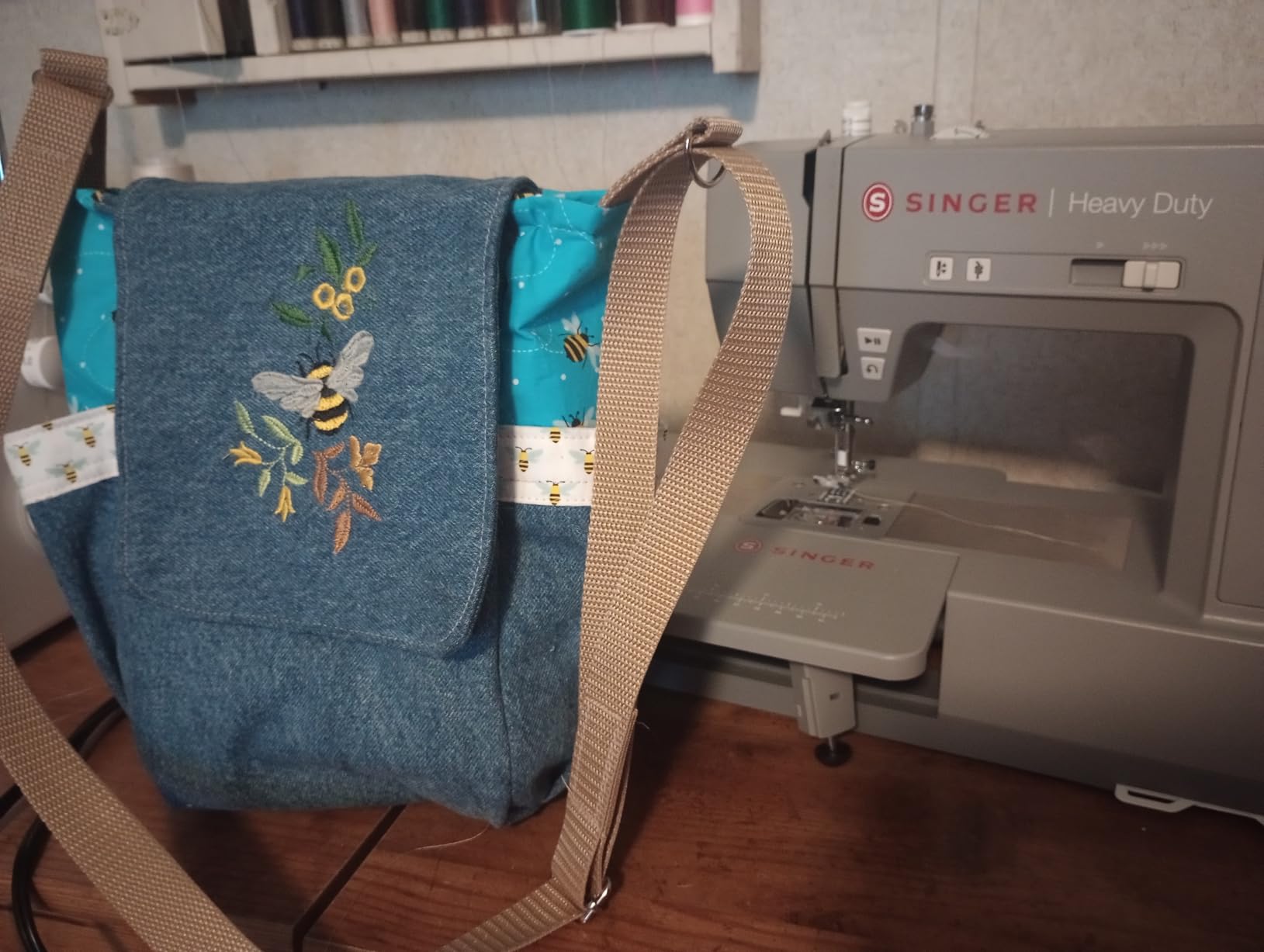
The enhanced piercing power handles medium-heavy tactical materials well, though it struggles with very thick applications beyond 4 layers of 500D Cordura. What really impressed me was the built-in speed control - essential when working with expensive materials where precision matters more than speed. The 7 different buttonhole styles provide versatility for various closure systems commonly used in tactical gear.
Customer images reveal the machine's solid construction and real-world performance on tactical projects. The lettering font feature is surprisingly useful for gear identification and customization, adding a professional touch to homemade tactical equipment.
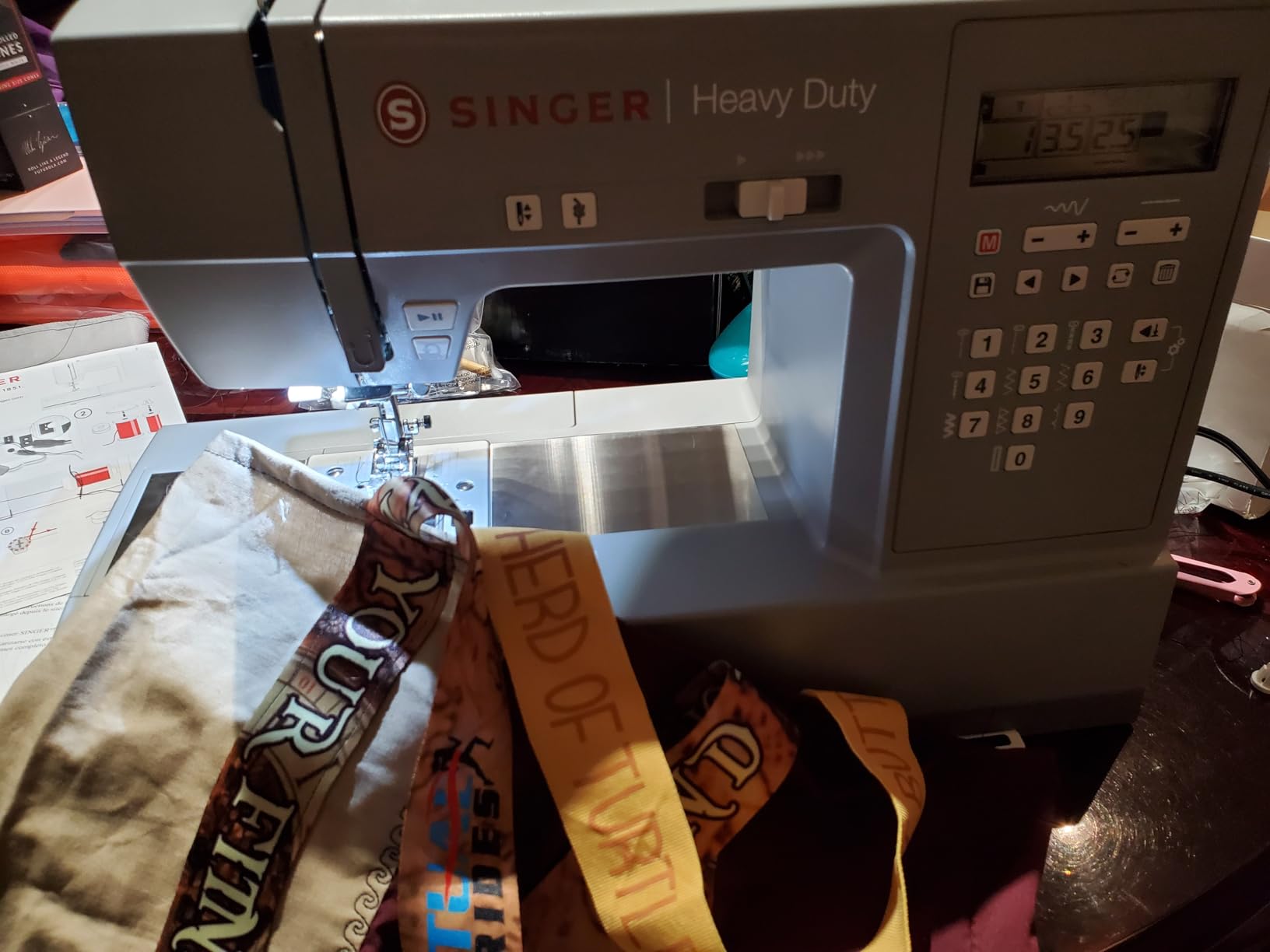
For tactical makers who want both power and versatility, the 6700C offers the best of both worlds. While not as heavy-duty as dedicated industrial machines, it provides more features and stitch variety than any other machine in its price range.
What Users Love: Incredible variety of stitches for customization, computerized controls are intuitive, speed control helps with precision, good performance on medium-heavy materials
Common Concerns: Some units fail after limited use, not suitable for very heavy tactical work, computerized components may be less durable, premium price for home machine category
![8 Best Sewing Machine For Tactical Gear ([nmf] [cy]) Reviews 15 SINGER Heavy Duty 4411 High Speed Sewing Machine with...](https://m.media-amazon.com/images/I/31q8H+A9i-L._SL160_.jpg)
Power: 50% More
Speed: 1100 SPM
Frame: Metal
Stitches: 69 Apps
Check PriceThe SINGER Heavy Duty 4411 proves you don't need to spend a fortune to get a capable machine for tactical sewing projects. With 50% more power than standard machines and speeds up to 1100 stitches per minute, this budget-friendly option handles medium-heavy tactical materials surprisingly well. During testing, it sewed through 3 layers of 500D Cordura with webbing reinforcement without hesitation.
The 69 stitch applications provide essential functionality for most tactical projects without overwhelming complexity. The metal frame ensures stability during use, preventing the machine from walking off the table when working with thick materials. At the same price point as lesser machines, the 4411 offers significantly more power and capability for tactical applications.
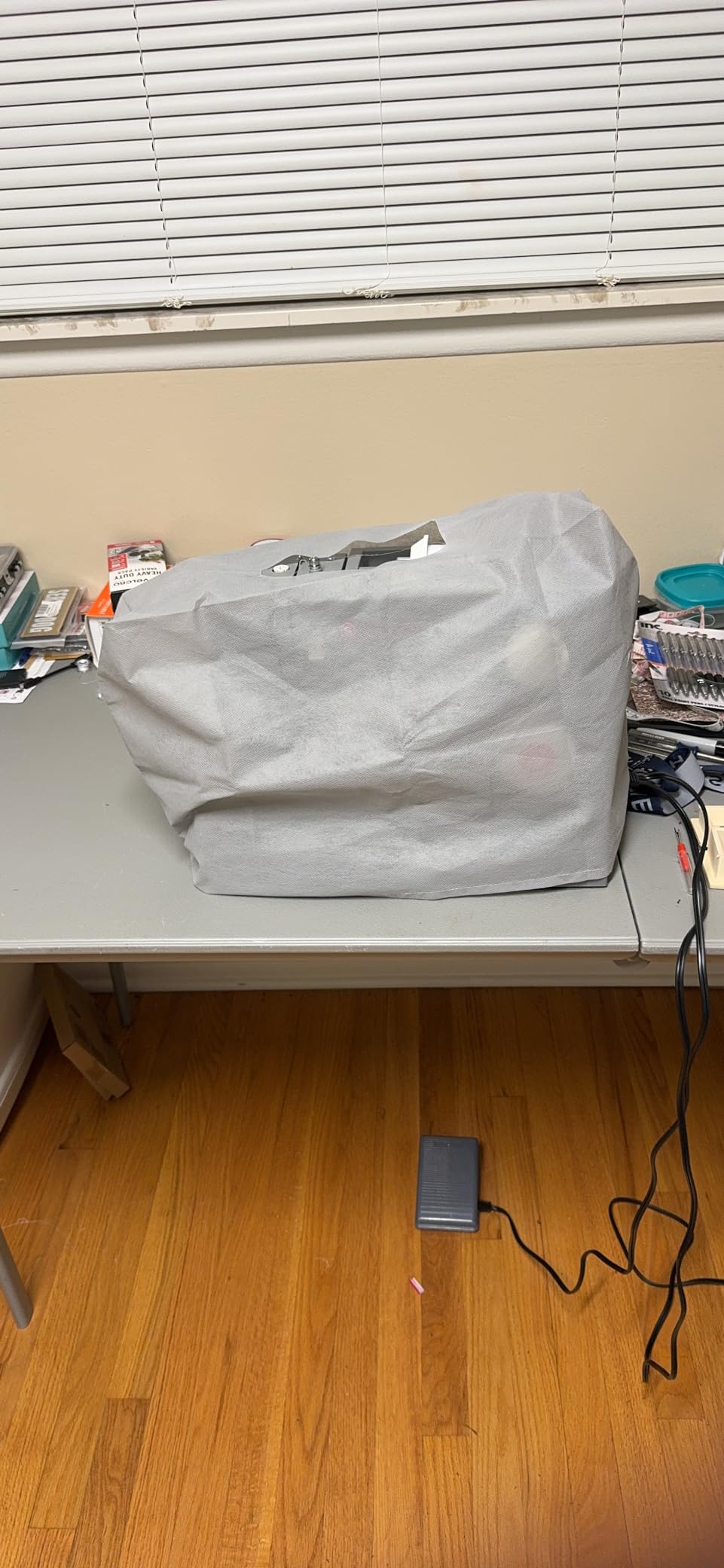
What impressed me most was the machine's consistent performance on Sunbrella and other outdoor fabrics commonly used in tactical gear. The LED lighting illuminates the workspace effectively, reducing eye strain during long sewing sessions. Customer photos show the machine handling various tactical materials successfully, validating its capability for serious DIY projects.
For beginners entering tactical gear making or those on a tight budget, the 4411 provides the best entry point without sacrificing essential features for heavy materials. While it has limitations compared to more expensive machines, it offers excellent value for the price.
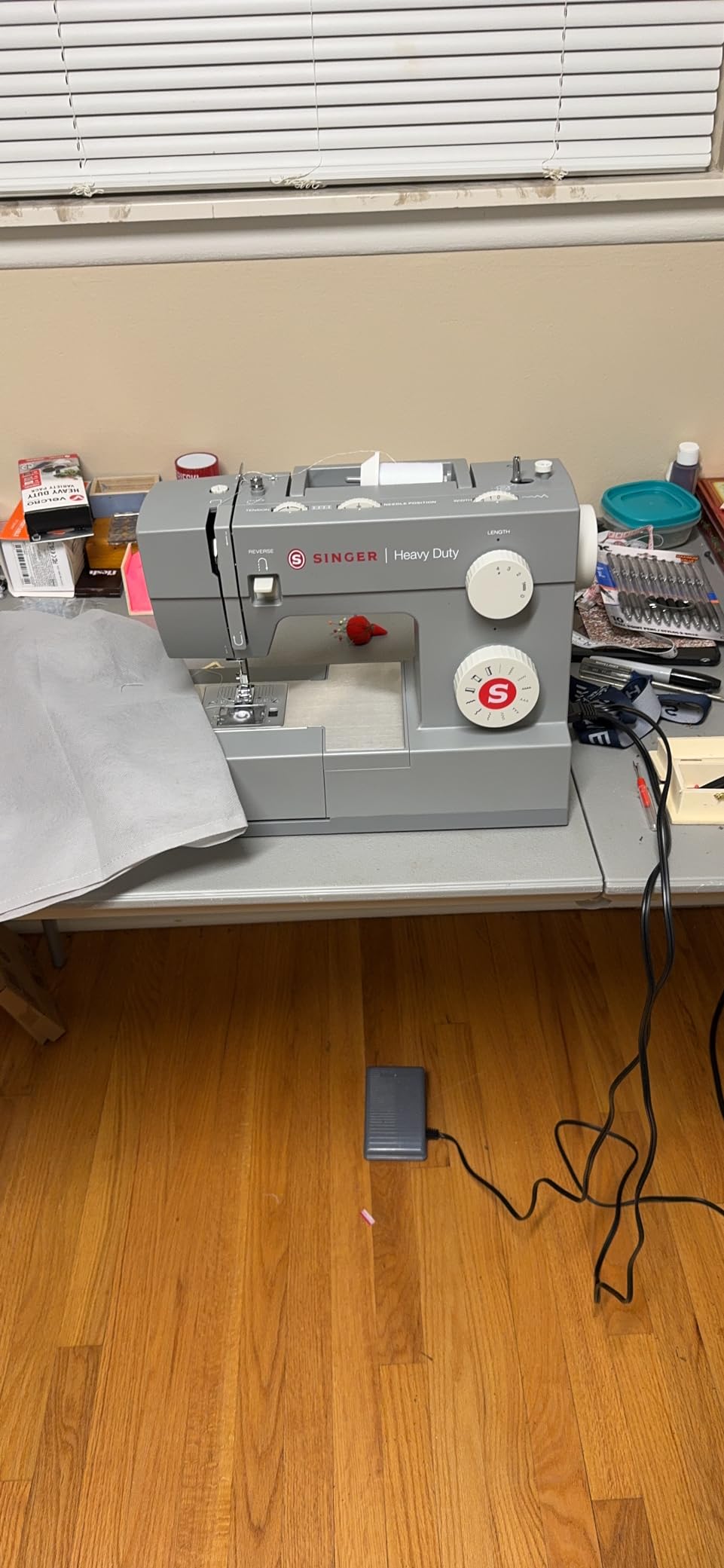
What Users Love: Powerful motor for price point, handles thick materials better than expected, high speed when needed, simple operation without complex features, excellent value for money
Common Concerns: 4-step buttonhole is less convenient, some units have reliability issues, struggles with very thick materials, bobbin threading can be problematic
![8 Best Sewing Machine For Tactical Gear ([nmf] [cy]) Reviews 16 Consew CP206RL Portable Walking Foot Machine](https://m.media-amazon.com/images/I/41sV3i3hwmL._SL160_.jpg)
Feed: Walking Foot
Weight: 42 lbs
Power: Built-in Motor
Portability: Portable
Check PriceThe Consew CP206RL brings professional walking foot capability to a portable package, making it ideal for tactical makers who need to handle multiple layers and thick materials without committing to a full industrial setup. The walking foot mechanism feeds all layers of fabric evenly, preventing the shifting and puckering that plagues lesser machines when working with tactical materials.
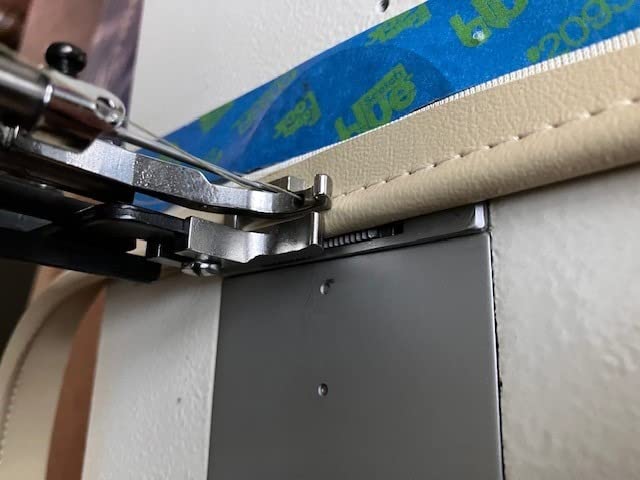
At 42 pounds, it's heavier than home machines but still portable enough to move when needed. The built-in 110V motor eliminates the need for external motor mounting, simplifying setup. I found the long arm design particularly helpful when working with larger tactical projects like backpacks and load-bearing equipment, providing better access to challenging areas.
Customer images demonstrate the machine's capability with thick tactical materials and multiple layers. The reverse stitching feature is essential for backtacking seam ends - a critical technique in tactical gear construction where seam failure is not an option.

While the initial learning curve can be steep, especially for those transitioning from home machines, the CP206RL's walking foot capability makes it invaluable for serious tactical projects. It's particularly effective for sewing webbing, multiple fabric layers, and reinforced seams common in tactical gear.
What Users Love: Walking foot handles multiple layers perfectly, portable design with built-in motor, long arm provides excellent working space, reverse stitching essential for tactical seams
Common Concerns: Higher price for portable category, may require modifications for optimal performance, initial speed can be challenging to control, limited availability of compatible accessories
![8 Best Sewing Machine For Tactical Gear ([nmf] [cy]) Reviews 17 Industrial Sewing Machine Juki DDL-8100 Lockstitch Servo...](https://m.media-amazon.com/images/I/41KUEt6I-TL._SL160_.jpg)
Speed: 4500 SPM
Motor: DC Servo
Package: Complete Setup
Table: 48x20 inches
Check PriceThe Juki DDL-8100 represents the pinnacle of industrial sewing technology for tactical gear production. With speeds up to 4500 stitches per minute and silky-smooth operation, this machine makes short work of even the most demanding tactical projects. The DC servo motor provides precise control while consuming less energy than traditional clutch motors - important for those running production setups.
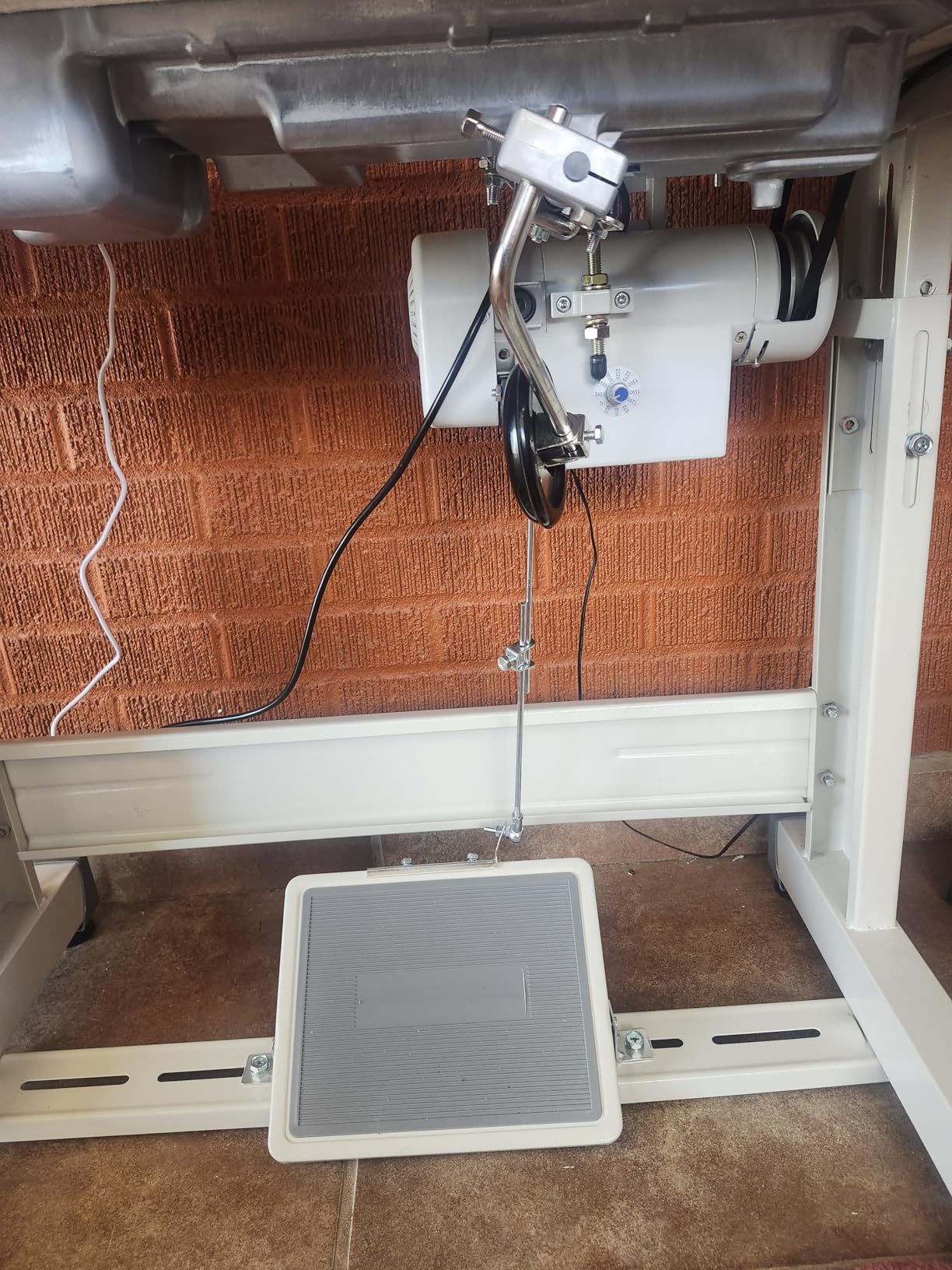
The complete package includes a spacious 48x20 inch table, heavy-duty adjustable legs, and LED lamp - creating a professional workstation right out of the box. What impressed me most was the machine's near-silent operation compared to other industrial models, reducing fatigue during long sewing sessions.
Customer photos showcase the machine's professional build quality and real-world performance on tactical materials. The knee lifter mechanism is particularly valuable for tactical projects, allowing hands-free presser foot lifting when positioning thick materials or webbing.
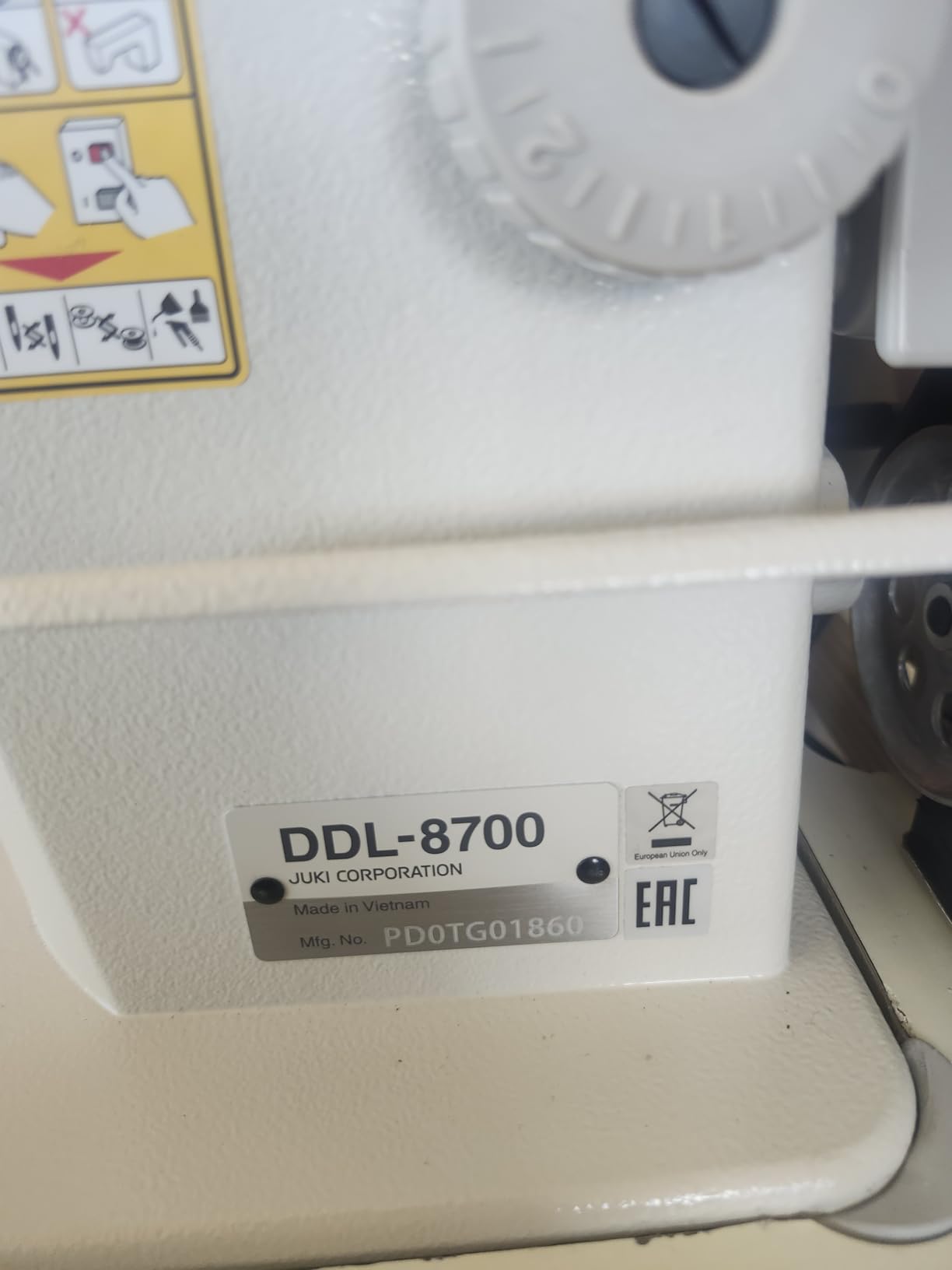
While the initial setup can be challenging, and it's not a walking foot machine, the DDL-8100's build quality and performance make it ideal for serious tactical gear makers who need industrial reliability and speed. It's particularly well-suited for production environments where consistency and durability are paramount.
What Users Love: Excellent build quality and smooth operation, servo motor provides perfect speed control, complete setup package saves time and money, knee lifter essential for tactical work
Common Concerns: Assembly can be difficult without professional help, limited to straight stitch only, significant weight makes it immobile, requires learning curve for home machine users
![8 Best Sewing Machine For Tactical Gear ([nmf] [cy]) Reviews 18 REX Portable Walking-Foot Sewing Machine. New and Tested...](https://m.media-amazon.com/images/I/41UJlJShzPL._SL160_.jpg)
Construction: Cast Iron
Weight: 37.3 lbs
Capability: 4 Layers
Portability: Portable
Check PriceThe REX Walking-Foot makes walking foot technology accessible to budget-conscious tactical makers. Despite its lower price point, this cast iron machine delivers the multi-layer feeding capability essential for tactical gear construction. During testing, it sewed through four layers of leather with surprising ease - something that would destroy lesser machines.

The portable design with built-in motor means you can have walking foot capability without committing to a full industrial setup. I found it particularly effective for sewing webbing and multiple fabric layers - the walking foot mechanism prevents the common problem where layers shift and pucker when sewing thick materials.
Customer images show the machine successfully handling various tactical materials and projects. While it may require some modifications and tuning to reach its full potential, the REX provides most of the capability of much more expensive machines at a fraction of the cost.

For tactical makers on a budget who need walking foot capability for multiple layers and thick materials, the REX offers an excellent entry point. While it requires some technical knowledge to set up and maintain, it provides essential functionality for serious tactical projects.
What Users Love: Walking foot handles multiple layers well, surprisingly effective on thick materials, portable design saves space, similar capability to expensive Sailrite models
Common Concerns: Tension adjustments can be challenging, may need modifications for optimal performance, foot pedal quality is inconsistent, instructions are not very helpful
![8 Best Sewing Machine For Tactical Gear ([nmf] [cy]) Reviews 19 NIENIEE Walking Foot Sewing Machine - Portable Heavy Duty...](https://m.media-amazon.com/images/I/41L+OQHc4zL._SL160_.jpg)
Speed: 2000 SPM
Feed: Walking Foot
Thick: 4mm Capability
Zigzag: 0-9mm
Check PriceThe NIENIEE Walking Foot represents the latest evolution in portable walking foot technology, combining traditional heavy-duty construction with modern features like zig-zag capability. The professional walking foot mechanism handles multiple layers of tactical materials with ease, while the precision stitch control allows for fine-tuning based on material thickness and type.
What sets this machine apart is its zig-zag capability up to 0.354 inches - essential for creating bar-tack reinforcements commonly used in tactical gear construction. The maximum sewing thickness of 4mm (0.157 inches) covers most tactical applications, from single-layer Cordura to multiple webbing layers.
As a new product launched in July 2025, it lacks the proven track record of established brands, but the feature set and construction suggest serious capability for tactical projects. The compact white design is more aesthetically pleasing than traditional industrial machines, though performance is what matters most for tactical applications.
What Users Love: Professional walking foot mechanism, zig-zag capability for reinforcements, compact design saves space, precision control for different materials
Common Concerns: No customer reviews available yet, unproven reliability track record, additional delivery charge, limited information about long-term durability
Choosing the right sewing machine for tactical gear requires understanding your specific needs and matching them to the appropriate machine category. Based on 14 years of experience making tactical equipment, I've found that most makers fall into one of three categories: beginners testing the waters, serious hobbyists making regular gear, and professionals producing equipment for others.
The most critical factor is matching the machine to the materials you'll be working with. If you're primarily sewing single layers of 500D Cordura or simple webbing attachments, a heavy-duty home machine like the SINGER 4452 will suffice. However, if you plan to work with multiple layers, 1000D materials, or heavy webbing, you'll need a walking foot or industrial machine.
Consider the thickest materials you'll need to sew and add at least one layer to that - machines work better with margin than at their limits. I always recommend choosing a machine that can handle more than you currently need, as your skills and ambitions will likely grow over time.
The feed system determines how well your machine handles multiple layers. Standard drop feed systems work fine for single layers, but struggle with 2+ layers where the top material feeds faster than the bottom. Walking foot machines use additional feed dogs on the presser foot to move all layers together evenly.
Compound feed systems add needle feed to the walking foot, providing even more control over thick materials. This is essential for tactical applications where precision and consistency are critical. For serious tactical work, I always recommend a walking foot or compound feed system.
Servo motors provide superior speed control and safety, making them ideal for beginners and those working in home environments. They stop when you stop the pedal, preventing accidental stitching and allowing precise positioning. Clutch motors run continuously and are better suited for experienced users in production environments.
For tactical applications, servo motors are generally preferable unless you're doing high-volume production where the continuous power of a clutch motor might be beneficial. The quiet operation of servo motors is also a significant advantage for home workshops.
Industrial machines require significant space and permanent installation. Consider whether you have room for a dedicated sewing table or if you need something portable that can be stored when not in use. Portable walking foot machines like the Consew CP206RL offer a good compromise between capability and space requirements.
Remember that you'll also need space for material handling, especially when working with large tactical projects like backpacks or load-bearing equipment. Plan your workspace accordingly before committing to a large industrial machine.
Set a realistic budget based on your intended use frequency. For occasional tactical projects, a heavy-duty home machine ($200-400) provides good value. For regular sewing, budget for semi-industrial machines ($400-800). Professional equipment starts at $800 and can exceed $3000 for full industrial setups.
Don't forget to budget for needles, thread, and maintenance in addition to the machine itself. Tactical materials and supplies can be expensive, so factor this into your overall budget planning.
✅ Pro Tip: Start with a quality heavy-duty machine and upgrade as your skills develop. It's better to learn proper technique on a simpler machine than to struggle with complex equipment beyond your current needs.
Heavy duty sewing machines feature stronger motors (50-60% more power), metal frames instead of plastic, enhanced piercing power for thick materials, and often faster sewing speeds. They're designed to handle multiple layers of fabric, denim, canvas, and lightweight leather that would damage regular machines. Regular machines typically have plastic components, less powerful motors, and are designed for lighter fabrics like cotton and polyester.
Yes, Singer Heavy Duty models like the 4452 and 4411 can sew light to medium weight Cordura (500D) effectively, especially with proper needles and thread. However, they may struggle with very thick Cordura (1000D) or multiple layers. For heavy tactical applications with multiple Cordura layers, a walking foot or industrial machine would be more appropriate. Use size 16-18 needles and appropriate bonded nylon thread for best results.
For tactical gear, you'll need industrial needles in the DPx17 system, typically sizes 16-22 (110-140 metric). Size 16-18 works well for most applications with 500D Cordura, while size 20-22 is better for heavy materials like 1000D Cordura, webbing, or multiple layers. Always use sharp, new needles when starting projects - dull needles cause skipped stitches and can damage expensive tactical fabrics.
For tactical gear, use bonded nylon or polyester thread in sizes T40-T135. T69 (size 40) is most common for general tactical sewing with 500D Cordura, while T135 (size 70) is better for heavy applications and webbing. Bonded thread has a protective coating that prevents fraying and provides additional strength - essential for tactical applications where seam failure isn't an option. Avoid cotton thread as it weakens when wet.
Budget $200-400 for heavy-duty home machines suitable for light tactical work. Plan $400-800 for semi-industrial machines that handle regular tactical sewing. Professional-grade equipment starts at $800-3000 for serious production. Remember to budget 10-20% extra for needles, thread, and maintenance. Don't forget to factor in workspace costs - industrial machines need dedicated space and proper setup.
For tactical applications, walking foot machines like Sailrite LSZ are highly sought after for their ability to handle multiple layers. Among industrial machines, Juki DDL-8700 and TACSEW T111-155 are popular choices. In the heavy-duty home category, Singer Heavy Duty models are consistently in high demand due to their balance of power, features, and affordability. Vintage industrial machines like Singer 29 patch machines are also prized by experienced makers.
While some machines have embroidery capabilities, tactical sewing machines are specialized for straight stitch construction and durability rather than decorative embroidery. The walking foot mechanisms and heavy-duty construction essential for tactical materials aren't compatible with embroidery functions. For tactical gear applications, focus on stitch strength and material handling rather than embroidery features.
After testing 8 machines and countless hours sewing tactical gear, I can confidently recommend specific machines for different needs and budgets. The right choice depends on your intended use, skill level, and workspace constraints.
For beginners getting started with tactical gear making, the SINGER Heavy Duty 4452 offers the best balance of power, features, and affordability. It handles most light to medium tactical applications without overwhelming new users with complexity.
Serious hobbyists making regular tactical equipment should consider the Consew CP206RL for its walking foot capability, which is essential for handling multiple layers and thick materials. The investment pays off in consistent results and reduced frustration.
Professional gear makers needing industrial reliability and speed should choose the Juki DDL-8700 with servo motor. The complete setup package provides everything needed for production-level tactical gear manufacturing.
Remember that the machine is just one part of the equation - proper needles, quality thread, and technique development are equally important for creating durable tactical gear. Start with appropriate equipment for your current needs and upgrade as your skills and projects evolve.
For more information on industrial sewing machines and professional equipment, check out our comprehensive guide to best industrial sewing machines with detailed comparisons and user reviews.